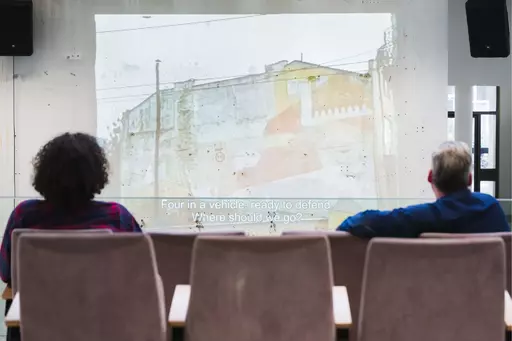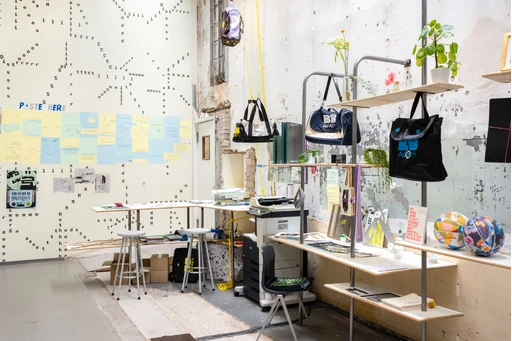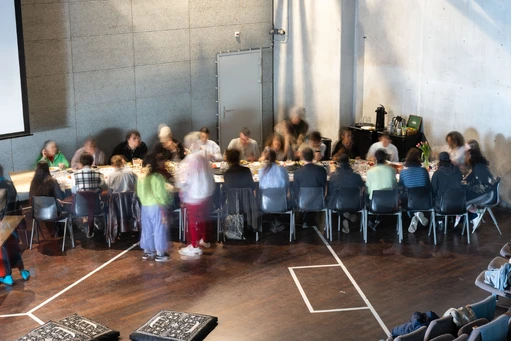
About
BAK, basis voor actuele kunst, Utrecht is a base for art, theory, and social action. BAK is committed to the notion of art as a public sphere and a political space, and provides a critical platform for aesthetico-political experiments with and through art. BAK brings together artists, thinkers, and other members of the precarious classes to imagine and enact transformative ways of being together otherwise.
BAK, basis voor actuele kunst is a leading international platform for theoretically-informed, politically-driven art and experimental research. Based in Utrecht, BAK addresses the social, ideological, and environmental urgencies of the present by combining public programming and exhibition-making with research, learning, and talent development. Working with communities involved in arts, activisms, and academia—and bringing artists, scholars, and other members of the precarious classes together—BAK cultivates art as a public sphere and a space for aesthetico-political experiments.
BAK’s current long-term program Propositions for Non-Fascist Living (2017–ongoing) is prompted by the dramatic resurfacing and normalization of historical and contemporary fascisms in our present, and advocates art as imagining and enacting ways of “being together otherwise.” Beside its public programs, BAK hosts a Fellowship Program and a new publishing series called Basics as part of a living archive of publishing projects.
Since its inception in 2000, BAK has systematically engaged in developing and testing institutional models to best accommodate and further shape the dynamically evolving fields of discursively and politically committed arts and their processes. This key element of BAK’s praxis, of instituting otherwise, has been one of synchronizing the thematics of public programming with the practice of the institution in terms of formatting events (beyond mere exhibitions), apportioning the institution’s resources (of knowledge, time, space, people, finances, etc.), and establishing its “social business plan.”
In September 2017, after seventeen years at Lange Nieuwstraat 4, BAK has moved to a new venue at Pauwstraat 13a, Utrecht. As we repurpose the building into a multi-functional site for the contemporary, BAK’s projects temporarily take place between the renovation stages; experiencing the gradual transformation of the former RASA Centre for World Cultures with the public. Developed with architecture studio Goldsmith, the venue is re-envisioned with ideas of openness, hospitality, flexibility, mobility, humbleness, and sustainability. The site will accommodate the hybrid, multi-layered institutional practices of BAK—including exhibitions, performances, screenings, conferences, workshops, and educational activities—and will offer a base for collective explorations of the art institution as a site of assembly, of being together otherwise.
BAK’s current long-term program Propositions for Non-Fascist Living (2017–ongoing) is prompted by the dramatic resurfacing and normalization of historical and contemporary fascisms in our present, and advocates art as imagining and enacting ways of “being together otherwise.” Beside its public programs, BAK hosts a Fellowship Program and a new publishing series called Basics as part of a living archive of publishing projects.
Since its inception in 2000, BAK has systematically engaged in developing and testing institutional models to best accommodate and further shape the dynamically evolving fields of discursively and politically committed arts and their processes. This key element of BAK’s praxis, of instituting otherwise, has been one of synchronizing the thematics of public programming with the practice of the institution in terms of formatting events (beyond mere exhibitions), apportioning the institution’s resources (of knowledge, time, space, people, finances, etc.), and establishing its “social business plan.”
In September 2017, after seventeen years at Lange Nieuwstraat 4, BAK has moved to a new venue at Pauwstraat 13a, Utrecht. As we repurpose the building into a multi-functional site for the contemporary, BAK’s projects temporarily take place between the renovation stages; experiencing the gradual transformation of the former RASA Centre for World Cultures with the public. Developed with architecture studio Goldsmith, the venue is re-envisioned with ideas of openness, hospitality, flexibility, mobility, humbleness, and sustainability. The site will accommodate the hybrid, multi-layered institutional practices of BAK—including exhibitions, performances, screenings, conferences, workshops, and educational activities—and will offer a base for collective explorations of the art institution as a site of assembly, of being together otherwise.
CONTACT
info@bakonline.org
bakonline.org
@bakbasecamp
For press inquiries, please contact at press@bakonline.org.
bakonline.org
@bakbasecamp
For press inquiries, please contact at press@bakonline.org.


ANBI
Find additional information here.
CHAMBER OF COMMERCE
Statutory name: Stichting BAK, basis voor actuele kunst
KVK-number: 41183440
BTW (VAT): NL800455484B01
BAK strives to be a space that is free from all forms of structural op- pression, including racism, sexism, ableism, homophobia, transphobia, xenophobia and age- ism. Within this context, we take responsibility for providing a safe working environment for everyone involved with the organization. No physical or verbal violence will be tolerated, nor will any other form of undesirable, inappropriate behaviour, sexual or otherwise. BAK recognises that this policy requires an ongoing collective effort, and we ask for your help. During your visit to BAK you are agreeing to actively support this goal. Download the code of conduct and protocol below for more information.
KVK-number: 41183440
BTW (VAT): NL800455484B01
BAK strives to be a space that is free from all forms of structural op- pression, including racism, sexism, ableism, homophobia, transphobia, xenophobia and age- ism. Within this context, we take responsibility for providing a safe working environment for everyone involved with the organization. No physical or verbal violence will be tolerated, nor will any other form of undesirable, inappropriate behaviour, sexual or otherwise. BAK recognises that this policy requires an ongoing collective effort, and we ask for your help. During your visit to BAK you are agreeing to actively support this goal. Download the code of conduct and protocol below for more information.